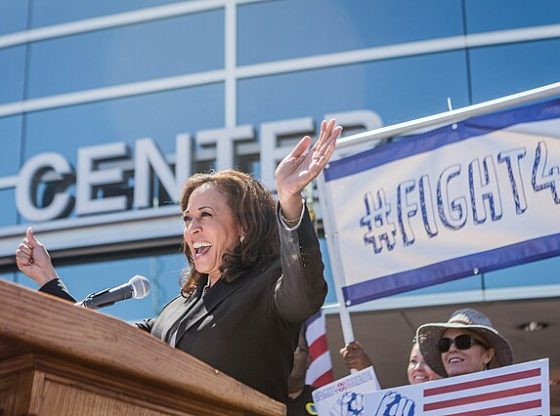Are there babies who are born alive after surviving an attempted abortion? Yes.
Did Vice President Kamala Harris agree to legislation aimed at protecting their life and health? No.
In 2019 and 2020, when Harris was serving in the Senate, she twice voted to block a bill that would have required doctors to provide the same health care to a newborn baby who had survived an abortion as they would to a newborn who had not been targeted for an abortion.
On its webpage about babies who survive attempted abortions, the Charlotte Lozier Institute provides a link to a study published in 2018 by Obstetrics & Gynecology. It is entitled: “Fetal Survival in Second-Trimester Termination of Pregnancy Without Feticide.”
“We conducted a retrospective analysis of 241 terminations of pregnancy without feticide for fetal anomalies or genetic abnormalities between 20 0/7 and 24 0/7 weeks of gestation at a single tertiary care center in Europe between February 2003 and May 2017,” said the study.
“Live birth occurred in 122 cases,” said the report.
In other words, more than half the babies in this study were born alive after their mothers underwent late-term “terminations of pregnancy.”
In 2019, Democratic Delegate Kathy Tran put up a bill in the Virginia state legislature that, as described by the Washington Post, “would have loosened restrictions on late-term abortions.”
On Jan. 30, 2019, then-Virginia Gov. Ralph Northam, who is a pediatric neurologist, did an interview on WTOP radio in which he was asked about this bill by reporter Julie Carey of NBC’s Washington-based affiliate.
“There was a very contentious committee hearing yesterday when Fairfax County Delegate Kathy Tran made her case for lifting restrictions on third-trimester abortions as well as other restrictions now in place,” Carey said.
“And she was pressed by a Republican delegate about whether her bill would permit an abortion even as a woman is essentially dilating, ready to give birth, and she answered that it would permit an abortion at that stage of labor,” the NBC reporter continued.
“Do you support her measure, and explain her answer?” Carey then asked Northam.
“Yeah, you know, I wasn’t there, Julie, and I certainly can’t speak for Delegate Tran,” Northam replied, according to a video of the interview. “But I will tell you, one, first thing I would say, this is why decisions such as this should be made by providers, physicians, and the mothers and fathers that are involved.
“There are, you know, when we talk about third-trimester abortions, these are done with the consent of, obviously, the mother with the consent of the physicians — more than one physician, by the way,” said Northam. “And it’s done in cases where there may be severe deformities. There may be a fetus that is nonviable.”
“So, in this particular example,” Northam said, “if a mother’s in labor, I can tell you exactly what would happen. The infant would be delivered. The infant would be kept comfortable. The infant would be resuscitated if that’s what the mother and the family desired. And then a discussion would ensue between the physicians and the mother.
“So, I think this was really blown out of proportion,” said Northam. “But, again, we want the government not to be involved in these types of decisions. We want the decision to be made by the mothers and their providers. And this is why, Julie, the legislators — most of whom are men, by the way — shouldn’t be telling a woman what she should and shouldn’t be doing with her body.”
Of course, despite what Northam said, a newborn baby who survives a late-term abortion is not the body of the mother. The infant has his or her own distinct body — and life.
The day after Northam gave this interview, Republican Sen. Ben Sasse of Nebraska went down to the Senate floor and introduced the Born Alive Abortion Survivor Protection Act. It would have prohibited treating a born baby the way Northam described.
“This bill establishes requirements for the degree of care a health care practitioner must exercise in the event a child is born alive following an abortion or attempted abortion,” read the official summary. “A health care practitioner who is present must (1) exercise the same degree of care as reasonably provided to another child born alive at the same gestational age, and (2) immediately admit the child to a hospital.”
The bill exempted the baby’s mother from criminal prosecution if these provisions were violated but it would have subjected another individual who violated them to a fine and “up to five years of prison.”
“The governor of Virginia has been defending a practice that is repugnant to civilized people across the entire world,” Sasse said on the Senate floor when he introduced the bill.
“Let’s be clear about what we are talking about,” he said. “We are talking about killing a baby who has been born.”
“We are talking about a little baby girl who has been born and is on a table in a hospital or medical facility, and then a decision or debate would be had about whether you could kill that little baby,” Sasse said.
“This is infanticide that we are talking about,” he said.
“Everyone in the Senate ought to be able to say unequivocally that killing that little baby is wrong,” said Sasse.
“Do we stand with those little, vulnerable babies in desperate need of care and comfort and support, medical treatment, food, or do we stand with the comments of the governor of Virginia over the last 2 days?” he said.
Fifty senators joined Sasse in co-sponsoring the bill.
On Feb. 25, 2019, a cloture motion was introduced to end debate on the bill and hold a substantive vote. The cloture motion needed 60 votes. It only got 53 — including three Democrats: Sen. Joe Manchin of West Virginia, Sen. Doug Jones of Alabama and Sen. Bob Casey, Jr. of Pennsylvania.
Sen. Kamala Harris of California was one of 43 Democrats (plus Independent Sen. Angus King of Maine) who voted against cloture and stopped the bill from getting a final vote.
A year later, on Feb. 25, 2020, the bill came up for cloture again. This time it got 56 votes — including all 53 Republicans and the same three Democrats.
Harris, however, was among the 40 Democrats (plus King) who once again succeeded in blocking a final substantive vote.
In Harris’ recent debate with former President Donald Trump, Moderator Linsey Davis asked her, “Would you support any restrictions on a woman’s right to an abortion?”
She responded: “I absolutely support reinstating the protections of Roe v. Wade. And as you rightly mentioned, nowhere in America is a woman carrying a pregnancy to term and asking for an abortion. That’s not happening.”
What did Roe allow? The U.S. Conference of Catholic Bishops has published a straightforward summary of what it effectively did — in combination with its companion case, Doe v. Bolton.
“Roe v. Wade was modified by another case decided the same day: Doe v. Bolton,” the summary reads. “In Doe v. Bolton the court ruled that a woman’s right to an abortion could not be limited by the state if the abortion was sought for reasons of maternal health. That court defined health as ‘all factors — physical, emotional, psychological, familial, and the woman’s age — relevant to the well-being of the patient.’ This health exception expanded the right to abortion for any reason through all three trimesters of pregnancy.”
During the Tuesday debate, Trump told moderator Linsey Davis: “You should ask will she allow abortion in the eighth month, ninth month, seventh month?”
“Because under Roe v. Wade … you could do abortions in the seventh month, the eighth month, the ninth month,” he said.
“That’s not true,” said Harris.
“And probably after birth,” Trump added. “Just look at the governor, former governor, of Virginia. The governor of Virginia said we put the baby aside and then we determine what we want to do with the baby.”
And Harris voted twice to block federal legislation to protect that born baby.
In 2021, according to the Centers for Disease Control and Prevention, 40 states plus New York City reported the number of abortions performed within their borders by the gestational age of the baby aborted. California, Connecticut, Illinois, Maryland, Massachusetts, New Hampshire, New Jersey, New York State, Pennsylvania, Wisconsin and the District of Columbia did not report their abortions by gestational age.
In New York City and the 40 states that did report, 4,070 babies were aborted at a gestational age of 21 weeks or more. In that 365-day year, that equaled an average of 11 late-term abortions per day.
Featured Image Credit: Office of Senator Kamala Harris












